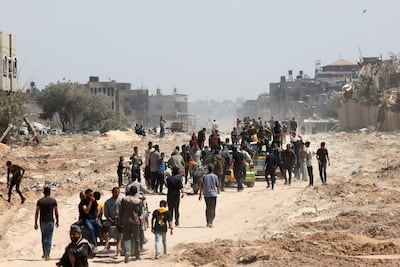Live updates: Follow the latest on Israel-Gaza
Most Israeli soldiers have withdrawn from southern Gaza following the departure of an army division from Khan Younis, Israeli media reported on Sunday morning as truce talks resumed in Cairo.
The 98th division – composed of three brigades – left the southern city of Khan Younis on Saturday night, army radio reported, leaving only the Nahal brigade operating in the war-torn enclave where more than 33,100 Palestinians have died in Israeli attacks.
Nahal troops will remain in Gaza to prevent Palestinians displaced to southern Gaza from returning to their homes in the north, according to local media reports.
There was no official confirmation from the army, nor any additional details immediately available.
White House National Security Council spokesman John Kirby told ABC News on Sunday that the US believes Israel’s partial withdrawal “is really just about rest and refit for these troops that have been on the ground for four months".
He said as far as the US could tell, it was necessarily "indicative of some coming new operation for these troops.”
Khan Younis has been the site of intense Israeli activity for months, including multiple raids on hospitals which killed patients, medical staff and volunteers at Al Amal and Nasser Hospitals.
The army said the months-long attack on Khan Younis "achieved what it set out to do," the Times of Israel reported, and seeks to emulate "intelligence-based" operations, which is how it described the recent raid on Al Shifa.
The two-week raid on Al Shifa completely destroyed Gaza's largest hospital and killed hundreds of people, according to Gaza authorities.
Sunday marks six months since the war began, sparked by a Hamas attack on southern Israel in which some 1,200 people were killed and around 240 taken to Gaza as hostages.
Israel's brutal response has killed 33,175 Palestinians as of Sunday, the majority said to be women and children, destroyed most of Gaza's basic infrastructure, and left millions of people facing imminent famine, according to the UN.
Another 75,886 have been wounded and thousands of others are still missing, presumed dead.
Israel called up more than 300,000 reservists as it invaded Gaza in late October, but began recalling reservist units from the enclave in January.
All reservist units left Gaza by late February, leaving only regular army forces fighting in the strip.
Shin Bet intelligence units have also been deployed to Gaza and participated in Israeli raids on Al Shifa, the army confirmed last week.
Israeli military divisions generally number between 10,000 and 16,000 soldiers, although they can number up to 20,000, while brigades are anywhere from 4,000-6,000 strong, comprising four to six battalions.
Israel has rotated soldiers in and out of combat since the ground invasion, pausing operations for some units to rest or train. The government has been under pressure to minimise the number of reservists sent to fight, amid mounting economic challenges.
The troop withdrawal could mean a ground operation in Rafah, a city where well over one million Palestinians are seeking shelter, is less likely, especially if the remaining brigade in southern Gaza will be tasked with controlling the movement of civilians, as was specified in the announcement.

The US, EU and regional countries have all warned that an Israeli attack on Rafah would greatly worsen the humanitarian crisis.
In January, Israel moved a large number of soldiers out of Gaza, but they were eventually replaced, although the overall number of soldiers committed to the war dropped.
Army spokesman Rear Admiral Daniel Hagari said at the time the troop rotation was to ensure forces "can be refreshed, the Israeli economy can function, families who are waiting for their loved ones can return to their routines".
Some observers say another reason for drawdowns is the build-up of forces on Israel’s border with Lebanon, amid Israeli warnings that it is preparing for full-scale war with Hezbollah.
It also comes amid mounting tensions with Iran following a suspected Israeli attack on Tehran's embassy compound in Damascus which killed several top Islamic Revolutionary Guard Corps commanders last week.
The army cancelled leave for combat troops following the attack.

